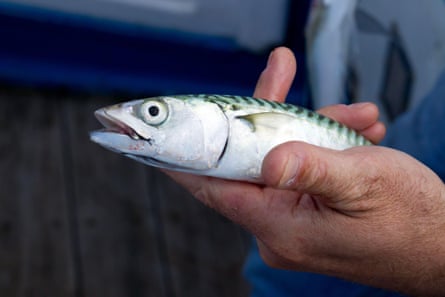Tinned, smoked, barbecued, or fried and squashed into a buttered bap – mackerel is one of the UK’s most versatile and affordable fish. And this seemingly abundant species has been widely touted as a top sustainable choice for seafood-lovers looking for a dose of omega-3.
Not any more. The UK’s Marine Conservation Society (MCS) recently downgraded the sustainability rating of north-east Atlantic mackerel, moving it from the “green” to the “amber” list on its Good Fish Guide.
But what prompted this decision? What should consumers do with this information? And are there any other sources of sustainable healthy fish oils?
Why has mackerel been downgraded?
In a nutshell: the main problem is governments aren’t good at sharing fishing quotas and have heaped pressure on mackerel populations in recent years.
The UK is one of 17 nations – including Iceland, Norway and several countries in the EU – that catch tonnes of mackerel from the north-east Atlantic annually. Stocks are assessed every few years by the International Council for the Exploration of the Sea (ICES), which then sets advisory catch limits to protect numbers.
While most countries agree on the scientific limit, they do not agree on how to share it, meaning that overall catches exceed the advised amount. The 17 mackerel-fishing countries have overstepped the ICES’s threshold by 41% on average since 2010.
There are some other contributing factors. Mackerel numbers have been declining since 2015 partly due to fewer young mackerel surviving to adulthood. This could be due to changing ocean temperatures, less available prey and disease. But this, alongside countries’ catch rates, is spelling trouble for mackerel numbers.
This year, states were supposed to remedy overfishing by agreeing how to divide the mackerel catch fairly. But a March 2023 meeting ended with no agreement – leaving mackerel exposed yet again.
Following this impasse, the MCS imposed its “amber” rating to spur action.
To eat, or not to eat?
Protecting this species from decline is important. Economically, Atlantic mackerel accounts for 32% of the UK’s fishing catch, according to the MCS, making it essential for those whose livelihoods rely on fishing. Sharks, whales, dolphins and dozens of other species also depend on rich mackerel shoals for food.

So should we curb our consumption?
Not entirely. Charlotte Coombes, Good Fish Guide manager at the MCS, says: “Mackerel is amber-rated, and an amber rating means try to find a more sustainable option if you can.”
“More sustainable” here can mean two things. First, mackerel lovers could buy their fish from lower-impact sources such as line-caught mackerel fisheries, says Coombes. These catches are more controlled than other methods, and some handline fisheries also stick to strict catch limits and protect young mackerel.
after newsletter promotion
Diversifying your diet is also a good habit generally. “There are loads more seafood options out there,” says Coombes. “Sometimes it just means being a little bit creative and perhaps trying something new. But it’s a way to spread the burden on our oceans.”
European anchovies and sardines are both rich in omega-3 and the Good Fish Guide greenlights these as alternatives to Atlantic mackerel. It’s worth noting, however, that ratings vary by individual fisheries, so it is always handy to know exactly where your fish comes from.
More generally, “sustainability” is a shifting concept. For example, the ICES assesses more than 200 species of fish in the north-east Atlantic alone, and the statuses of these can change over time depending on various factors, says Ewen Bell, a UK member of the ICES Advisory Committee.
Keeping abreast of changes through seafood apps such as the Good Fish Guide and MSC’s “blue tick” labels on fish is currently the best bet for making sustainable choices.
What’s next for mackerel?
North Atlantic fishing countries will need to agree on how to split the catch before the MCS will consider greenlighting mackerel again, says Coombes.
Momentum for change is growing among seafood companies and retailers. The North Atlantic Pelagic Advocacy Group – an initiative that includes Asda, Waitrose, M&S and the Co-op – has pushed for better mackerel management since 2019.
Meanwhile, consumers shouldn’t underestimate the power of their choices. Coombes says: “We know that supermarkets and restaurants do pay attention when people ask where’s my fish from? If they get the message that people care about that, they will start looking at their own sourcing policies more carefully.”
